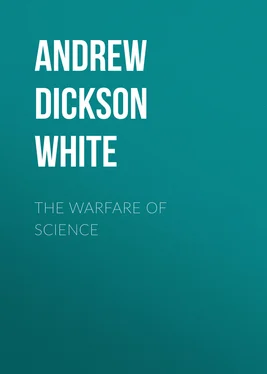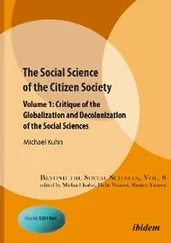Andrew Dickson White - The Warfare of Science
Здесь есть возможность читать онлайн «Andrew Dickson White - The Warfare of Science» — ознакомительный отрывок электронной книги совершенно бесплатно, а после прочтения отрывка купить полную версию. В некоторых случаях можно слушать аудио, скачать через торрент в формате fb2 и присутствует краткое содержание. Жанр: foreign_prose, foreign_religion, Философия, foreign_psychology, foreign_antique, на английском языке. Описание произведения, (предисловие) а так же отзывы посетителей доступны на портале библиотеки ЛибКат.
- Название:The Warfare of Science
- Автор:
- Жанр:
- Год:неизвестен
- ISBN:нет данных
- Рейтинг книги:5 / 5. Голосов: 1
-
Избранное:Добавить в избранное
- Отзывы:
-
Ваша оценка:
- 100
- 1
- 2
- 3
- 4
- 5
The Warfare of Science: краткое содержание, описание и аннотация
Предлагаем к чтению аннотацию, описание, краткое содержание или предисловие (зависит от того, что написал сам автор книги «The Warfare of Science»). Если вы не нашли необходимую информацию о книге — напишите в комментариях, мы постараемся отыскать её.
The Warfare of Science — читать онлайн ознакомительный отрывок
Ниже представлен текст книги, разбитый по страницам. Система сохранения места последней прочитанной страницы, позволяет с удобством читать онлайн бесплатно книгу «The Warfare of Science», без необходимости каждый раз заново искать на чём Вы остановились. Поставьте закладку, и сможете в любой момент перейти на страницу, на которой закончили чтение.
Интервал:
Закладка:
13
Virgil of Salzburg. See Neander's History of the Christian Church , Torrey's translation, vol. iii., p. 63. Since Bayle, there has been much loose writing about Virgil's case. See Whewell , p. 197; but for best choice of authorities and most careful winnowing out of conclusions, see De Morgan , pp. 24-26. For very full notes as to pagan and Christian advocates of doctrine of rotundity of the earth and of antipodes, and for extract from Zachary's letter, see Migne , Patrologia , vol. vi., p. 426, and vol. xli., p. 487. For Peter of Abano, or Apono, as he is often called, see Tiraboschi ; also, Ginguené , vol. ii., p. 293; also Naudé , Histoire des Grands hommes accusés de Magie . For Cecco d'Ascoli, see Montucla , Histoire des Mathématiques , i., 528; also, Daunou , Études Historiques , vol. vi., p. 320. Concerning Orcagna's representation of Cecco in flames of hell, see Renan , Averroès et l'Averroisme , Paris, 1867, p. 328.
14
For Columbus before the Junta of Salamanca, see Irving's Columbus , Murray's edition, vol. ii., pp. 405-410. Figuier , Savants du Moyen Age , etc., vol. ii., p. 394, et seq. Also, Humboldt , Histoire de la Géographie du Nouveau Continent .
15
See Daunou , Études Historiques , vol. ii., p. 417.
16
For effect of Magalhaens's voyages, and the reluctance to yield to proof, see Henri Martin , Histoire de France , vol. xiv., p. 395; St. Martin's Histoire de la Géog. , p. 369; Peschel , Geschichte des Zeitalters der Entdeckungen , concluding chapters; and for an admirable summary, Draper , Hist. Int. Dev. of Europe , pp. 451-453.
17
For general statement as to supplementary proof by measurement of degrees, and by pendulum, see Somerville , Phys. Geog. , chapter i, § 6, note. Also Humboldt , Cosmos , vol. ii., p. 736, and v., pp. 16, 32. Also Montucla , iv., 138.
18
Respectability of Geocentric Theory , Plato's Authority for it etc., see Grote's Plato , vol. iii., p. 257. Also, Sir G. C. Lewis , Astronomy of the Ancients , chap, iii., sec. i., for a very thoughtful statement of Plato's view, and differing from ancient statements. For plausible elaboration of it, see Fromundus , Anti-Aristarchus , Antwerp, 1631. Also Melanchthon , Initia Doctrinæ Physicæ .
19
For supposed agreement of Scripture with Ptolemaic theory, see Fromundus, passim , Melanchthon, and a host of other writers.
20
See St. Thomas Aquinas , Liber de Cœlo et Mundo , sec. xx.
21
For Germs of Heliocentric Theory planted long before , etc., see Sir G. C. Lewis ; also, Draper , Intellectual Development of Europe , p. 512; and for a succinct statement of the claims of Pythagoras, Philolaus, Aristarchus, and Martianus Capella, see Hœfer , Hist. de l'Astronomie , 1873, p. 107, et seq. For germs among thinkers of India, see Whewell , vol. i., p. 277. Also, Whitney , Oriental and Linguistic Studies , New York, 1874; Essay on the Lunar Zodiac , p. 345.
22
For general statement of De Cusa's work, see Draper , Intellectual Development of Europe , p. 512. For skillful use of De Cusa's view in order to mitigate censure upon the Church for its treatment of Copernicus's discovery, see an article in the Catholic World for January, 1869. For a very exact statement, in a spirit of judicial fairness, see Whewell , History of the Inductive Sciences , p. 275 and pp. 379, 380. In the latter, Whewell cites the exact words of De Cusa in the De Docta Ignorantia , and sums up in these words: "This train of thought might be a preparation for the reception of the Copernican system; but it is very different from the doctrine that the sun is the centre of the planetary system." In the previous passage, Whewell says that De Cusa "propounded the doctrine of the motion of the earth, more, however, as a paradox than as a reality. We cannot consider this as any distinct anticipation of a profound and consistent view of the truth." For Aristotle's views and their elaboration by St. Thomas Aquinas, see the treatise De Cœlo et Mundo . It is curious to see how even such a biographer of St. Thomas as Archbishop Vaughan slurs over the angelic doctor's errors. See Vaughan's Life and Labors of St. Thomas of Aquin , pp. 459, 460.
23
For improvement of mathematical processes, see Draper , Intellectual Development of Europe , 513. In looking at this and other admirable summaries, one feels that Prof. Tyndall was not altogether right in lamenting, in his farewell address at New York, that Dr. Draper has devoted so much of his time to historical studies.
24
Kopernik's danger at Rome. The Catholic World for January, 1869, cites a recent speech of the Archbishop of Mechlin before the University of Louvain, to the effect that Copernicus defended his theory, at Rome, in 1500, before two thousand scholars; also, that another professor taught the system in 1528, and was made Apostolic Notary by Clement VIII. All this, even if the doctrines taught were identical with those of Copernicus, as finally developed, which idea Whewell seems utterly to disprove, avails nothing against the overwhelming testimony that Copernicus felt himself in danger—testimony which the after-history of the Copernican theory renders invincible. The very title of Fromundus's book, already cited, published within a few miles of the archbishop's own cathedral, and sanctioned expressly by the theological Faculty of that same University of Louvain in 1630, utterly refutes the archbishop's idea that the Church was inclined to treat Copernicus kindly. The title is as follows:
"Anti-Aristarchus | Sive | Orbis-Terræ | Immobilis | In quo decretum S. Congregationis S. R. E. | Cardinalium | IƆC. XVI adversus Pytha | gorico-Copernicanos editum defenditur | Antwerpiæ MDCXXXI."
L'Epinois , Galilée , Paris, 1867, lays stress, p. 14, on the broaching of the doctrine by De Cusa, in 1435, and by Widmanstadt, in 1533, and their kind treatment by Eugenius IV. and Clement VII., but this is absolutely worthless in denying the papal policy afterward. Lange , Geschichte des Materialismus , vol. i., pp. 217, 218, while admitting that De Cusa and Widmanstadt sustained this idea and received honors from their respective popes, shows that, when the Church gave it serious consideration, it was condemned. There is nothing in this view unreasonable. It would be a parallel case to that of Leo X., at first inclined toward Luther and the others, in their "squabbles with the begging friars," and afterward forced to oppose them. That Copernicus felt the danger, is evident, among other things, by the expression in the preface, " Statim me explodendum cum tali opinione clamitant ."
25
For dangers at Wittenberg, see Lange , Geschichte des Materialismus , vol. i., p. 217.
26
Osiander, in a letter to Copernicus, dated April 20, 1541, had endeavored to reconcile him to such a procedure, and ends by saying, "Sic enim placidiores reddideris peripatheticos et theologos quos contradicturos metuis." See Apologia Tychonis in Kepleri Opera Omnia , Frisch's edition, vol. i., p. 246. Kepler holds Osiander entirely responsible for this preface. Bertrand, in his Fondateurs de l'Astronomie Moderne , gives its text, and thinks it possible that Copernicus may have yielded "in pure condescension toward his disciple." But this idea is utterly at variance with expressions in Copernicus's own dedicatory letter to the pope, which follows the preface. For a good summary of the argument, see Figuier , Savants de la Renaissance , pp. 378, 379. See, also, citation from Gassendi's life of Copernicus, in Flammarion , Vie de Copernic , p. 124. Mr. John Fiske, accurate as he usually is, in his recent Outlines of Cosmic Philosophy , appears to have followed Laplace, Delambre, and Petit into the error of supposing that Copernicus, and not Osiander, is responsible for the preface.
Читать дальшеИнтервал:
Закладка:
Похожие книги на «The Warfare of Science»
Представляем Вашему вниманию похожие книги на «The Warfare of Science» списком для выбора. Мы отобрали схожую по названию и смыслу литературу в надежде предоставить читателям больше вариантов отыскать новые, интересные, ещё непрочитанные произведения.
Обсуждение, отзывы о книге «The Warfare of Science» и просто собственные мнения читателей. Оставьте ваши комментарии, напишите, что Вы думаете о произведении, его смысле или главных героях. Укажите что конкретно понравилось, а что нет, и почему Вы так считаете.












